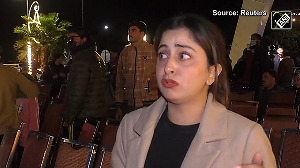The Andhra Pradesh government, which is releasing the next year's draft budget for public debate on Wednesday, has decided to enact a legislation to make government officials perform and fix accountability to achieve desired results.
Announcing this in Hyderabad on Tuesday, Chief Minister N Chandrababu Naidu said the proposed bill would help the government's new budgetary exercise to shift the focus from spending money to delivering results.
"This Act will make every official perform to achieve results expected of him and lay down high standards of citizen services. This system will take into account the money each official is entitled to spend and the results he is expected to deliver," Naidu explained.
He said that the government was examining whether the proposed legislation should provide for punishment and disincentives for non-performing officials, and at the same time rewarding those thoe who excel in their departments.
Naidu, addressing a state-level workshop on performance-based budget, said the proposed legislation would be part of a wider exercise to have performance-oriented budget with the ultimate goal of ensuring value for money.
He told ministers, secretaries and heads of departments that this new exercise would link funding to the expected results rather than to line up item costs in the traditional budgeting.
He reiterated his determination to make Andhra Pradesh a model state in the entire country. He said that the current exercise was to ensure that the government spent each rupee efficiently.
"We are spending Rs 40,000 crore every year and every rupee should be accounted for and spent in an efficient way to get the results. There is no other way," he said.
The seminar marked the beginning of an exercise to prepare the annual budget for 2003-04. For the second consecutive year, the government has decided to release the draft budget for public debate at various levels before the finance department finalises it by February 10.
He said that the allocations for some departments could be cut and linked to their performance, especially when resource constraints prevailed. "Funds are limited. It is a reality. Even oil-rich countries are learning to manage within the available resources. Money is always a scarce resource," he said.






 © 2025
© 2025